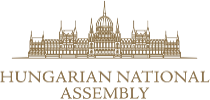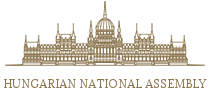Citizens with the right to vote elect the National Assembly for a term of nearly four years. Its mandate starts with the constitutive sitting of the National Assembly and ends with the constitutive sitting of the new Parliament.
The President of the Republic may dissolve Parliament in the cases specified in the Fundamental Law (failure to form a government or failure by the National Assembly to approve the central budget by 31 March). Parliament may also declare its own dissolution before its mandate expires. Since 1990, each Parliament has completed its term of four years.
Like most parliaments in Europe, the Hungarian National Assembly is characterised by lively debate and frequent tempestuous clashes between Members from the governing majority and the opposition – and rightly so: in addition to its legislative duties, Parliament serves the political function of expressing the most important political views in society. Nevertheless, the verbal parliamentary tussle is constrained by specific rules, a procedure that ensures free debate. The rules of debate and decision-making are enshrined in the Rules of Procedure.
The Fundamental Law provides the basic guarantees for the operation of the National Assembly, while the Rules of Procedure govern its operation in detail. The adoption and any amendment to the Fundamental Law require a two-thirds majority of all Members of Parliament, while adoption and any amendment to the Rules of Procedure are conditional upon a two-thirds majority of the Members in attendance.
The provisions governing the discussion and adoption of Acts represent a major priority among the rules of operation, as they establish the framework for one of the core functions of Parliament.
The National Assembly holds two ordinary sessions each year:
- from 1 February to 15 June
- from 1 September to 15 December.
An extraordinary session must be convened upon a motion to that effect by the President of the Republic, the government, or one-fifth of the Members of Parliament.
The National Assembly meets regularly during sessions. Sittings are convoked by the Speaker. If the parliamentary groups fail to reach an agreement, the House Committee or the Speaker will propose the orders of the day for a sitting. The orders of the day are adopted by a vote of the National Assembly.
The items placed on the orders of the day for sittings include a discussion and vote on bills and other motions pending before Parliament, a discussion of various reports, and interpellations and questions.
Parliament votes with most of its Members participating and normally with a simple majority of the votes, but it must abide by the qualified majority requirements laid down in the Rules of Procedure when voting on an amendment to the Fundamental Law, a cardinal act and certain matters relating to the operation of Parliament. Most votes pertaining to persons (such as the election of dignitaries) also require a qualified majority.
Verbatim minutes are taken during sittings and subsequently posted on the National Assembly website (Diary). The National Assembly website streams the entire day in session and a recording of previuos sittings available and retrievable on the Parliament's website.
The formation of the House Committee and its membership
The National Assembly has operated a House Committee since 1990. It is chaired by the Speaker; its membership consists of the Deputy Speakers, the Deputy of the Speaker of the National Assembly, and the parliamentary group leaders. Internationally, most parliaments have a body with a similar composition and duties, though they have a variety of names (General Committee, Presidium, Standing Bureau, Council of Elders etc). These served as models in the creation of the House Committee of the Hungarian National Assembly.
Responsibilities of the House Committee
The main duty of the House Committee is to ensure the uninterrupted operation of the National Assembly and to settle disputes arising from its operation. All other duties serve the same purpose.
The House Committee forms its position on the parliamentary work schedule (such as holding plenary sittings and scheduling committee meetings). If the parliamentary groups fail to reach an agreement on such matters, Parliament will vote at the beginning of each session in February and September.
The House Committee proposes a schedule for the National Assembly that includes the subject matter and the manner in which submissions are discussed. This explains why the agendas for House Committee meetings include two permanent items: (i) proposed detailed orders of the day for the upcoming plenary and (ii) provisional orders of the day for three subsequent sittings. As part of the orders of the day for a plenary sitting, the House Committee may propose that Parliament discuss certain submissions contrary to the Rules of Procedure, and that it use a different timeframe; it may also propose a particular duration for speaker's remarks.
The House Committee forms an opinion on whether or not parliamentary proceedings should be open to the media and on cultivating international relations, it makes preparations for celebrations, and it establishes the procedure for certifying absences from parliamentary voting and committee meetings. The House Committee has important duties relating to supporting personnel decisions and is also responsible for proceeding in disciplinary matters affecting Members.
The bylaws of the House Committee contain a complete list of its duties along with the basic rules governing its operation.
The operation of the House Committee
The House Committee is a body that aids in laying the groundwork for parliamentary decision-making. Unlike plenary sittings and committee meetings, it is not a forum for discussing proposed legislation and other motions, as its supreme function is to ensure the uninterrupted operation of Parliament, to reach the consensus necessary to that end, and to devise a work schedule for Parliament. Accordingly, political clashes are not typical of House Committee meetings.
One of the core principles of the operation of the House Committee calls for the formation of opinions based on consensus. Only parliamentary group leaders enjoy the right to vote. If no consensus is reached, the right to decide and to make proposals rests with the Speaker. Proposals made by the Speaker go before the National Assembly for a vote.
A representative for the government regularly attends House Committee meetings with consultative rights. The view of the representative is an important factor in shaping proposed orders of the day. The chairperson of the Committee on National Minorities in Hungary is also a permanent invitee at House Committee meetings.
The Speaker convokes meetings of the House Committee. A meeting must be convened upon the request of any of the parliamentary group leaders. During plenary sittings, the presiding chair (Deputy Speaker) may also take steps to convene the House Committee.




